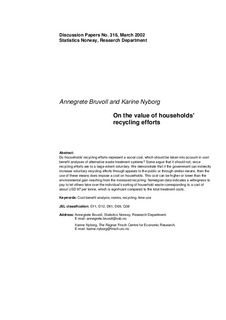On the value of households' recycling efforts
| dc.contributor.author | Bruvoll, Annegrete | |
| dc.contributor.author | Nyborg, Karine | |
| dc.date.accessioned | 2011-11-26T18:37:00Z | |
| dc.date.available | 2011-11-26T18:37:00Z | |
| dc.date.issued | 2002 | |
| dc.identifier.issn | 1892-753x | |
| dc.identifier.uri | http://hdl.handle.net/11250/180175 | |
| dc.description.abstract | Abstract: Do households' recycling efforts represent a social cost, which should be taken into account in cost-benefit analyses of alternative waste treatment systems? Some argue that it should not, since recycling efforts are to a large extent voluntary. We demonstrate that if the government can indirectly increase voluntary recycling efforts through appeals to the public or through similar means, then the use of these means does impose a cost on households. This cost can be higher or lower than the environmental gain resulting from the increased recycling. Norwegian data indicates a willingness to pay to let others take over the individual’s sorting of household waste corresponding to a cost of about USD 87 per tonne, which is significant compared to the total treatment costs. Keywords: Cost-benefit analysis, norms, recycling, time use | no_NO |
| dc.language.iso | eng | no_NO |
| dc.publisher | Statistics Norway, Research Department | no_NO |
| dc.relation.ispartofseries | Discussion Papers;No. 316 | |
| dc.subject | Recycling | no_NO |
| dc.subject | Households | no_NO |
| dc.subject | Cost-benefit analysis | no_NO |
| dc.subject | Norms | no_NO |
| dc.subject | Time use | no_NO |
| dc.subject | JEL classification: D11 | no_NO |
| dc.subject | JEL classification: D12 | no_NO |
| dc.subject | JEL classification: D61 | no_NO |
| dc.subject | JEL classification: D69 | no_NO |
| dc.subject | JEL classification: Q38 | no_NO |
| dc.title | On the value of households' recycling efforts | no_NO |
| dc.type | Working paper | no_NO |
| dc.subject.nsi | VDP::Social science: 200::Economics: 210::Economics: 212 | no_NO |
| dc.source.pagenumber | 21 s. | no_NO |
Tilhørende fil(er)
Denne innførselen finnes i følgende samling(er)
-
Discussion Papers [1003]
